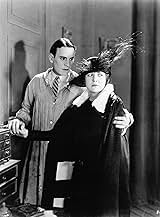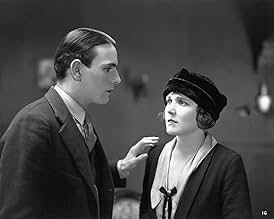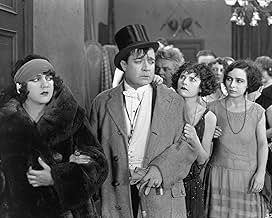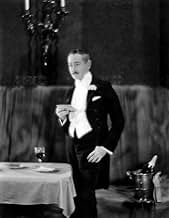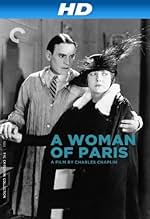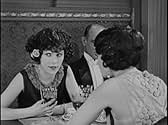IMDb-BEWERTUNG
6,9/10
6681
IHRE BEWERTUNG
Eine Mätresse trifft ihren ehemaligen Verlobten wieder und fühlt sich zwischen Liebe und Bequemlichkeit hin- und hergerissen.Eine Mätresse trifft ihren ehemaligen Verlobten wieder und fühlt sich zwischen Liebe und Bequemlichkeit hin- und hergerissen.Eine Mätresse trifft ihren ehemaligen Verlobten wieder und fühlt sich zwischen Liebe und Bequemlichkeit hin- und hergerissen.
- Auszeichnungen
- 3 wins total
Charles K. French
- Jean's Father
- (as Charles French)
Nellie Bly Baker
- Masseuse
- (Nicht genannt)
Henry Bergman
- Head Waiter
- (Nicht genannt)
Charles Chaplin
- Station Porter
- (Nicht genannt)
Frank Coghlan Jr.
- Boy
- (Nicht genannt)
Antonio Corsi
- Accordion Player
- (Nicht genannt)
Harry d'Abbadie d'Arrast
- Man in Nightclub
- (Nicht genannt)
Stella De Lanti
- Revel's Fiancée
- (Unbestätigt)
- (Nicht genannt)
Jean de Limur
- Man in Nightclub
- (Nicht genannt)
Charles Farrell
- Man in Nightclub
- (Nicht genannt)
Bess Flowers
- Mannequin
- (Nicht genannt)
Empfohlene Bewertungen
Finally saw Woman of Paris: this was a legendary film in its day, but mostly because it was virtually never re-released for sixty years after it premiered in 1923, so the legend grew in its absence. The parts of the story that were not told would have made a better movie than the movie, for example why the lovers' fathers at the beginning of the film are against the marriage, and how Marie (Edna Purviance) became a (shudder) "Woman of Paris" during the year following her departure from her fiance. So I didn't buy the story but the camera work and editing do marvelous things with the story that is there. The melodramatic climax is a bit much to be believed, but not comical as a lot of silent mellers appear today. A little D.W. Griffith (sophisticated early use of photography to tell story and set mood), a little Tolstoy ("bad woman" story contrasted with storyteller's emphasis on happy marriages and wholesome family life), a touch of Dreiser ("sinful" characters shown with realistic insight) and I'd guess a soupcon of Terrence Ratigan (sophisticated attitudes) but I doubt he was around then. The ad copy for this film says Chaplin has a cameo as a railway porter but I didn't notice one in the train scene: I suspect instead he was the ticket agent whose hand appears pointing out the ticket window toward the train. Altogether a satisfying and entertaining film, but the story would have been better if Chaplin had worked on it a little longer.
A Woman Of Paris was an acclaimed success with the critics when it was Originally released on 1st October 1923. However, the audience despised it as they wanted to see Charlie Chaplin the tramp starring in a film not a film directed by Chaplin in which he does not appear (albeit in a small cameo role). When i first saw the film on BBC2 around Christmas 1998 i thought Chaplin had a starring role so was naturally disappointed when i found out this wasn't the case. However, since then i have become a huge fan of Chaplin and all his work so now I think this film is rated among Chaplin's best features. His musical score composed in 1976 with Eric Rogers was Chaplin's last ever work in his film career which spanned 62 years. By 1976 Chaplin was very frail and struggled to communicate so the fact that he could compose the music for a near 80 minute film is amazing and the fact that the music score is as good as any of his other films is also astonishing. Charles Chaplin was a true genius of Cinema and A Woman Of Paris is an excellent example of Chaplin as director, writer and composer.
I was looking in Charlie Chaplin's memoirs and I found that his original idea for the plot of A Woman Of Paris came from pillow talk with Peggy Hopkins Joyce involving one of her former boyfriends, a French publisher. From this came Charlie's idea to direct, but not appear in a film and hopefully make his long time leading lady from slapstick comedy, Edna Purviance a major dramatic star.
The reason given for the non-success of A Woman of Paris is usually given as the fact that people bought tickets and were disappointed that they did not see a Charlie Chaplin comedy. Probably on the silent screen, star images were even more fixed in people's minds than they were when sound came in.
But seeing it today it really does go overboard into melodrama. Edna's a simple country girl who loves Carl Miller, a struggling artist. Some blind mischances of fate and she winds up the paid woman of Parisian rake Adolphe Menjou. It's the tragedy of one romantic and the salvation of sorts for the other that are the basis of the story.
You couldn't make a film like it today, audiences would just laugh at it. In 1923 audiences were looking for laughs attached to the Chaplin name and found none. Edna does a fine job, but the public would not accept her in a drama. Adolphe Menjou as the rake comes off best in the cast.
The film ironically enough was Chaplin's first for the newly formed United Artists of which he was a quarter interest partner. After this one failed at the box office, he went back to cranking out the comedies we expected from him.
Back when I was working person at New York State Crime Victims Board, I had a claimant named Wayne Purviance who was the victim of an anti-gay bias attack in 1982. It was a crime that galvanized the GLBT people of New York City, this person in particular. Wayne was the grand nephew of Edna Purviance.
He's no longer among the living, but to you Wayne Purviance who took some real blows for millions of people, this review is lovingly dedicated to you and your wonderful aunt.
The reason given for the non-success of A Woman of Paris is usually given as the fact that people bought tickets and were disappointed that they did not see a Charlie Chaplin comedy. Probably on the silent screen, star images were even more fixed in people's minds than they were when sound came in.
But seeing it today it really does go overboard into melodrama. Edna's a simple country girl who loves Carl Miller, a struggling artist. Some blind mischances of fate and she winds up the paid woman of Parisian rake Adolphe Menjou. It's the tragedy of one romantic and the salvation of sorts for the other that are the basis of the story.
You couldn't make a film like it today, audiences would just laugh at it. In 1923 audiences were looking for laughs attached to the Chaplin name and found none. Edna does a fine job, but the public would not accept her in a drama. Adolphe Menjou as the rake comes off best in the cast.
The film ironically enough was Chaplin's first for the newly formed United Artists of which he was a quarter interest partner. After this one failed at the box office, he went back to cranking out the comedies we expected from him.
Back when I was working person at New York State Crime Victims Board, I had a claimant named Wayne Purviance who was the victim of an anti-gay bias attack in 1982. It was a crime that galvanized the GLBT people of New York City, this person in particular. Wayne was the grand nephew of Edna Purviance.
He's no longer among the living, but to you Wayne Purviance who took some real blows for millions of people, this review is lovingly dedicated to you and your wonderful aunt.
If nothing else, you have to give Charlie Chaplin a lot of credit for taking a shot at something so different from his usual fare. (Though he himself only appears on-screen for a few seconds this time, he did almost everything else in the production.) And while "A Woman of Paris" is certainly a cut below his comedy features, it's a pretty good melodrama, and you'd have to think that with experience Chaplin could have gone on to become almost as effective with straight melodrama as he was with his sentimental comedies. It's not really surprising that after this he returned to comedy for good, but that was just to keep audiences happy, not because he couldn't do drama, since this is a decent effort.
Chaplin's own frequent lady Edna Purviance is convincing as the young woman whose tangled love affairs pull her away from her true love and into a set of tangled relationships in the empty, decadent world of the Parisian idle classes. Except for being rather contrived - there are far too many coincidences and pat developments in the plot, and they do not work as well in serious drama as they would in a comedy - the story is interesting and fairly creative. It does get a bit heavy at times, since there is very little comic relief, but Adolphe Menjou helps keep it from getting unbearably serious with a good performance as the carefree, irresponsible Pierre. He shows that even without dialogue he can make this kind of character lively and memorable.
Since it doesn't quite measure up to the standard of either the best Chaplin features or the best silent melodramas, "A Woman of Paris" may not have a niche of its own, except for its historical interest. But it's quite an interesting change of pace from Chaplin, and an above average movie that's worth seeing.
Chaplin's own frequent lady Edna Purviance is convincing as the young woman whose tangled love affairs pull her away from her true love and into a set of tangled relationships in the empty, decadent world of the Parisian idle classes. Except for being rather contrived - there are far too many coincidences and pat developments in the plot, and they do not work as well in serious drama as they would in a comedy - the story is interesting and fairly creative. It does get a bit heavy at times, since there is very little comic relief, but Adolphe Menjou helps keep it from getting unbearably serious with a good performance as the carefree, irresponsible Pierre. He shows that even without dialogue he can make this kind of character lively and memorable.
Since it doesn't quite measure up to the standard of either the best Chaplin features or the best silent melodramas, "A Woman of Paris" may not have a niche of its own, except for its historical interest. But it's quite an interesting change of pace from Chaplin, and an above average movie that's worth seeing.
A melodrama rather than the saucy Parisian comedy the title and the name of Charles Chaplin suggests. Promptly withdrawn by its creator, 'A Woman of Paris' was for over half a century one of those films whose reputation was based upon it's unavailability for reappraisal and like many of Chaplin's later films was to prove a disappointment when it was finally revived in the 1970s.
Both the plot and the wardrobe worn by Chaplin's leading lady Edna Purviance evokes the era of Chaplin's fellow United Artist D. W. Griffith rather than the continental sophistication suggested by the title, while the presence of Adolphe Menjou happily anticipates the nascent sophistication of the twenties.
Both the plot and the wardrobe worn by Chaplin's leading lady Edna Purviance evokes the era of Chaplin's fellow United Artist D. W. Griffith rather than the continental sophistication suggested by the title, while the presence of Adolphe Menjou happily anticipates the nascent sophistication of the twenties.
Wusstest du schon
- WissenswertesThe reissue of this film, with a musical score and new cut by Sir Charles Chaplin, was the last work of his entire film career. By then, the 87-year-old Chaplin was visibly frail but still walking. His score was aided by arranger Eric James, and he took a small theme from Monsieur Verdoux - Der Frauenmörder von Paris (1947), but most of the score was Chaplin's. The film was reissued posthumously in 1977 with the new score to overwhelming critical and public praise. At that time, many critics praised it (as in the trailer) as one of the best films ever made.
- PatzerWhen Jean starts fighting with Pierre in the restaurant, Pierre's glass of wine or champagne gets knocked over. When Pierre sits down on the table afterwards, the glass stands on the table filled with drink as if it hadn't been knocked over.
- Zitate
[Intertitle]: Time heals, and experience teaches that the secret of happiness is in service to others.
- Alternative VersionenDuring 1976, Chaplin was preparing a reissue of A Woman of Paris/Sunnyside but died before completion. The project was completed after his death, and the films were reissued in the United States by Kino International Corp. in 1978. This version, however, dispensed with an opening subtitle, as well as a few brief insert shots.
- VerbindungenFeatured in Chaplin Today: Modern Times (2003)
Top-Auswahl
Melde dich zum Bewerten an und greife auf die Watchlist für personalisierte Empfehlungen zu.
- How long is A Woman of Paris: A Drama of Fate?Powered by Alexa
Details
- Erscheinungsdatum
- Herkunftsland
- Offizieller Standort
- Sprache
- Auch bekannt als
- Eine Frau in Paris
- Drehorte
- Produktionsfirma
- Weitere beteiligte Unternehmen bei IMDbPro anzeigen
Box Office
- Budget
- 351.000 $ (geschätzt)
- Weltweiter Bruttoertrag
- 12.921 $
- Laufzeit
- 1 Std. 22 Min.(82 min)
- Sound-Mix
- Seitenverhältnis
- 1.33 : 1
Zu dieser Seite beitragen
Bearbeitung vorschlagen oder fehlenden Inhalt hinzufügen

